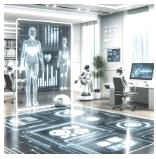The Future of AI in Customer Care Service and Its Impact on Healthcare

Revolutionizing Customer Service: Is AI the Game-Changer for the Future?

The image above portrays the future landscape of healthcare enhanced by AI.
Artificial Intelligence (AI) is rapidly transforming various industries, and customer care service is no exception. With advancements in AI technology, businesses are leveraging AI to enhance customer experiences, streamline operations, and provide personalized support. This article explores how AI is revolutionizing customer care service and its potential impact on healthcare.
AI in Customer Care Service
- Conversational Virtual Agents: AI-powered chatbots and virtual agents are redefining self-service by understanding natural speech and handling routine inquiries. These agents can resolve issues faster, reduce customer frustration, and free up human agents for more complex tasks.
- AI-Powered Agent Assistance: Real-time support tools provide agents with relevant suggestions, knowledge base articles, and response recommendations. This assistance helps agents personalize interactions, improve response times, and increase efficiency.
- Dynamic Call Routing: Intelligent call routing matches customers with the most suitable agent based on their interaction history, preferences, and current needs. This ensures a more personalized experience and higher customer satisfaction.
- 24/7 Availability: AI-driven support systems can operate continuously, providing assistance beyond standard business hours and catering to global audiences. This round-the-clock availability enhances customer satisfaction and loyalty.
- Predictive Analytics: AI analyzes customer data in real-time, predicting customer needs and proactively addressing issues before they escalate. This proactive approach improves customer retention and reduces churn rates.
Impact of AI on Healthcare
AI is also making significant strides in the healthcare industry, transforming patient care and health management. Here are some key areas where AI is impacting healthcare:
- Diagnosis and Treatment: AI algorithms can analyze medical images, detect anomalies, and assist in diagnosing complex conditions more efficiently. This leads to faster and more accurate diagnoses, improving patient outcomes.
- Personalized Medicine: AI can analyze vast amounts of patient data to identify patterns and predict individual responses to treatments. This enables personalized treatment plans tailored to each patient's unique needs.
- Administrative Efficiency: AI automates routine administrative tasks, such as scheduling appointments, managing patient records, and processing insurance claims. This reduces the administrative burden on healthcare professionals, allowing them to focus on patient care.
- Remote Monitoring: Wearable devices and AI-powered applications enable remote monitoring of patients' health conditions. This allows healthcare providers to track patients' progress, detect early signs of complications, and intervene promptly.
- Research and Development: AI accelerates the research and development of new drugs and treatments by analyzing large datasets and identifying potential drug candidates. This speeds up the drug discovery process and brings innovative treatments to market faster.
In conclusion, AI is revolutionizing both customer care service and healthcare, offering unprecedented opportunities to enhance customer experiences and improve patient care. As AI technology continues to evolve, businesses and healthcare providers must embrace these advancements to stay competitive and deliver exceptional service.
Example Text
